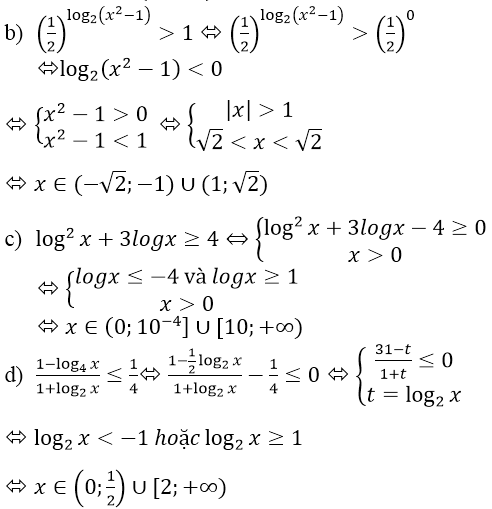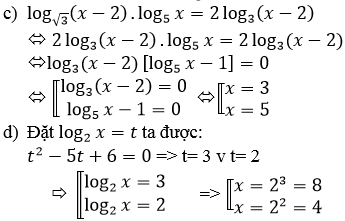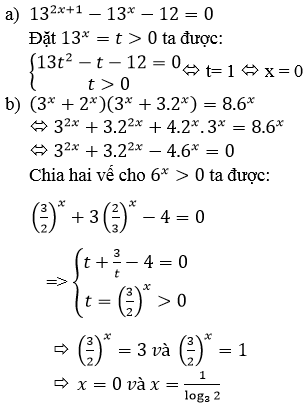Hãy nhập câu hỏi của bạn vào đây, nếu là tài khoản VIP, bạn sẽ được ưu tiên trả lời.

a) Điều kiện: \(\left\{{}\begin{matrix}4x+2>0\\x-1>0\\x>0\end{matrix}\right.\)
Hay là: \(x>1\)
Khi đó biến đổi pương trình như sau:
\(\ln\dfrac{4x+2}{x-1}=\ln x\)
\(\Leftrightarrow\dfrac{4x+2}{x-1}=x\)
\(\Leftrightarrow4x+2=x\left(x-1\right)\)
\(\Leftrightarrow x^2-5x-2=0\)
\(\Leftrightarrow\left[{}\begin{matrix}x_1=\dfrac{5+\sqrt{33}}{2}\\x_2=\dfrac{5-\sqrt{33}}{2}\left(loại\right)\end{matrix}\right.\)
Vậy nghiệm của phương trình là: \(x=\dfrac{5+\sqrt{33}}{2}\)
b) Điều kiện: \(\left\{{}\begin{matrix}3x+1>0\\x>0\end{matrix}\right.\)
Hay là: \(x>0\)
Biến đổi phương trình như sau:
\(\log_2\left(3x+1\right)\log_3x-2\log_2\left(3x+1\right)=0\)
\(\Leftrightarrow\log_2\left(3x+1\right)\left(\log_3x-2\right)=0\)
\(\Leftrightarrow\left[{}\begin{matrix}\log_2\left(3x+1\right)=0\\\log_3x=2\end{matrix}\right.\)
\(\Leftrightarrow\left[{}\begin{matrix}3x+1=2^0\\x=3^2\end{matrix}\right.\)
\(\Leftrightarrow\left[{}\begin{matrix}x=0\left(loại\right)\\x=9\end{matrix}\right.\)
Vậy nghiệm là x = 9.

Đặt \(t=\log_2x\) ta có bất phương trình :
\(2t^3+5t^2+t-2\ge0\)
hay
\(\left(t+2\right)\left(2t^2+t-1\right)\ge0\)
Bất phương trình này có nghiệm -2\(\le t\)\(\le-1\) hoặc \(t\ge\frac{1}{2}\)
Suy ra nghiệm của bất phương trình là :
\(\frac{1}{4}\le x\)\(\le\frac{1}{2}\) hoặc \(x\ge\sqrt{2}\)

Điều kiện :
\(\begin{cases}x-2>0\\3x-5>0\end{cases}\) \(\Leftrightarrow x>2\)
Phương trình tương đương \(\log_2\left(x-2\right)+\log_2\left(3x-5\right)=2\)
\(\Leftrightarrow\log_2\left[\left(x-2\right)\left(3x-5\right)\right]=2\Leftrightarrow3x^2-11x+6=0\)
Giải phương trình trên và đối chiếu với điều kiện ta được nghiệm phương trình đã cho là x=3

\(log_3x-log_5x.log_2x=0\)
\(\Leftrightarrow\frac{log_2x}{log_23}-\frac{log_2x}{log_25}.log_2x=0\)
\(\Leftrightarrow log_2x\left(\frac{1}{log_23}-\frac{log_2x}{log_25}\right)=0\)
\(\Leftrightarrow\left[{}\begin{matrix}log_2x=0\\\frac{1}{log_23}=\frac{log_2x}{log_25}\end{matrix}\right.\) \(\Leftrightarrow\left[{}\begin{matrix}log_2x=0\\log_2x=\frac{log_25}{log_23}=log_35\end{matrix}\right.\)
\(\Rightarrow T=log_2\left(x_1x_2\right)=log_2x_1+log_2x_2=0+log_35=log_35\)

a) Đặt t = 13x > 0 ta được phương trình:
13t2 – t – 12 = 0 ⇔ (t – 1)(13t + 12) = 0
⇔ t = 1 ⇔ 13x = 1 ⇔ x = 0
b)
Chia cả hai vế phương trình cho 9x ta được phương trình tương đương
(1+(23)x)(1+3.(23)x)=8.(23)x(1+(23)x)(1+3.(23)x)=8.(23)x
Đặt t=(23)xt=(23)x (t > 0) , ta được phương trình:
(1 + t)(1 + 3t) = 8t ⇔ 3t2 – 4t + 1 = 0 ⇔ t∈{13,1}t∈{13,1}
Với t=13t=13 ta được nghiệm x=log2313x=log2313
Với t = 1 ta được nghiệm x = 0
c) Điều kiện: x > 2
Vì nên phương trình đã cho tương đương với:
[log3(x−2)=0log5x=1⇔[x=3x=5[log3(x−2)=0log5x=1⇔[x=3x=5
d) Điều kiện: x > 0
log22x – 5log2x + 6 = 0
⇔(log2x – 2)(log2x – 3) = 0
⇔ x ∈ {4, 8}

Điều kiện x>1
Từ (1) ta có \(\log_{\sqrt{3}}\frac{x+1}{x-1}>\log_34\) \(\Leftrightarrow\frac{x+1}{x-1}>2\) \(\Leftrightarrow\) 1<x<3
Đặt \(t=\log_2\left(x^2-2x+5\right)\)
Tìm điều kiện của t :
- Xét hàm số \(f\left(x\right)=\log_2\left(x^2-2x+5\right)\) với mọi x thuộc (1;3)
- Đạo hàm : \(f\left(x\right)=\frac{2x-2}{\ln2\left(x^2-2x+5\right)}>\) mọi \(x\in\left(1,3\right)\)
Hàm số đồng biến nên ta có \(f\left(1\right)\) <\(f\left(x\right)\) <\(f\left(3\right)\) \(\Leftrightarrow\)2<2<3
- Ta có \(x^2-2x+5=2'\)
\(\Leftrightarrow\) \(\left(x-1\right)^2=2'-4\)
Suy ra ứng với mõi giá trị \(t\in\left(2,3\right)\) ta luôn có 1 giá trị \(x\in\left(1,3\right)\)
Lúc đó (2) suy ra : \(t-\frac{m}{t}=5\Leftrightarrow t^2-5t=m\)
Xét hàm số : \(f\left(t\right)=t^2-5t\) với mọi \(t\in\left(2,3\right)\)
- Đạo hàm : \(f'\left(t\right)=2t-5=0\Leftrightarrow t=\frac{5}{2}\)
- Bảng biến thiên :
| x | 2 \(\frac{5}{2}\) 3 |
| y' | + 0 - |
| y | -6 -6 -\(\frac{25}{4}\) |
Để hệ có 2 cặp nghiệm phân biệt \(\Leftrightarrow-6>-m>-\frac{25}{4}\)\(\Leftrightarrow\)\(\frac{25}{4}\) <m<6



